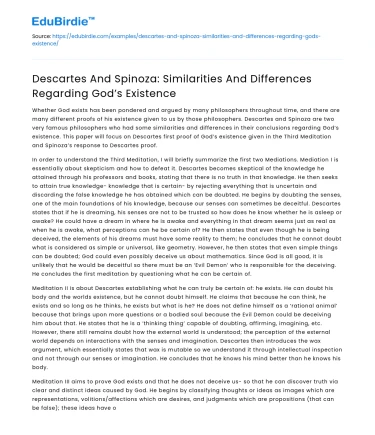Whether God exists has been pondered and argued by many philosophers throughout time, and there are many different proofs of his existence given to us by those philosophers. Descartes and Spinoza are two very famous philosophers who had some similarities and differences in their conclusions regarding God’s existence. This paper will focus on Descartes first proof of God’s existence given in the Third Meditation and Spinoza’s response to Descartes proof.
In order to understand the Third Meditation, I will briefly summarize the first two Mediations. Mediation I is essentially about skepticism and how to defeat it. Descartes becomes skeptical of the knowledge he attained through his professors and books, stating that there is no truth in that knowledge. He then seeks to attain true knowledge- knowledge that is certain- by rejecting everything that is uncertain and discarding the false knowledge he has obtained which can be doubted. He begins by doubting the senses, one of the main foundations of his knowledge, because our senses can sometimes be deceitful. Descartes states that if he is dreaming, his senses are not to be trusted so how does he know whether he is asleep or awake? He could have a dream in where he is awake and everything in that dream seems just as real as when he is awake, what perceptions can he be certain of? He then states that even though he is being deceived, the elements of his dreams must have some reality to them; he concludes that he cannot doubt what is considered as simple or universal, like geometry. However, he then states that even simple things can be doubted; God could even possibly deceive us about mathematics. Since God is all good, it is unlikely that he would be deceitful so there must be an ‘Evil Demon’ who is responsible for the deceiving. He concludes the first meditation by questioning what he can be certain of.
Save your time!
We can take care of your essay
- Proper editing and formatting
- Free revision, title page, and bibliography
- Flexible prices and money-back guarantee
Meditation II is about Descartes establishing what he can truly be certain of: he exists. He can doubt his body and the worlds existence, but he cannot doubt himself. He claims that because he can think, he exists and so long as he thinks, he exists but what is he? He does not define himself as a ‘rational animal’ because that brings upon more questions or a bodied soul because the Evil Demon could be deceiving him about that. He states that he is a ‘thinking thing’ capable of doubting, affirming, imagining, etc. However, there still remains doubt how the external world is understood; the perception of the external world depends on interactions with the senses and imagination. Descartes then introduces the wax argument, which essentially states that wax is mutable so we understand it through intellectual inspection and not through our senses or imagination. He concludes that he knows his mind better than he knows his body.
Meditation III aims to prove God exists and that he does not deceive us- so that he can discover truth via clear and distinct ideas caused by God. He begins by classifying thoughts or ideas as images which are representations, volitions/affections which are desires, and judgments which are propositions (that can be false); these ideas have origins-adventitious (external), innate (independently true), and those he creates (Descartes, p. 114). These ideas represent substances which contain objective reality, some which have more than others because they have higher formal reality. Descartes then gives his first proof for the existence of God, which is as follows:
The cause of an idea must have as much formal reality as there is objective reality contained in the idea. I, an imperfect being, have an idea of God as an infinite and perfect being. This idea of God contains more objective reality than other ideas. This idea of God has more objective reality than my idea. The cause of this idea must have as much objective reality as what it is an idea of. I do not contain as much objective reality as my idea of God does, therefore its source is external to me. Only God has as much formal or eminent reality as there is objective reality in my idea of God. The source of my idea is god. Therefore, God exists (Descartes, p. 117-121).
Descartes believes that he has an idea of God because he cannot fail to have an idea of an infinite being since it is innate. Since he has an idea of an infinite being, there must be infinite objective reality. He then says something cannot come from nothing, which leads him to state the premises regarding reality in cause and effect and formal and objective reality in an idea. From there, he can conclude that since he has an idea of God with infinite objective reality, there is a being with infinite formal reality who is the cause behind his idea. Ultimately, this leads him to conclude that God exists. Descartes proves God’s existence and concludes God is not a deceiver because that would imply a defect, and God is good and perfect.






 Stuck on your essay?
Stuck on your essay?

